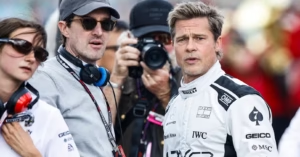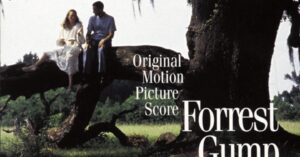
Leonardo DiCaprio says he was once told his name was “too ethnic” for Hollywood.
The Oscar-winning actor shared the story during a lively appearance on the New Heights Podcast
He joined his One Battle After Another co-star Benicio del Toro to talk about their careers, film influences, and their new movie.
The conversation delivered both entertainment and insight, and it offered a sharp look at how Hollywood has changed—and how it still needs to.
The “Too Ethnic” Name Incident
DiCaprio recalled a startling moment from his teenage years when he first signed with an agent.
According to him, the agent arranged a headshot and then delivered a brand new identity.
“They said, ‘Your name is too ethnic,’ and suggested I go by Lenny Williams,” DiCaprio explained.
The logic was blunt and revealing, suggesting that a non-Anglo name could be a barrier to being hired.
It was a message many performers from diverse backgrounds have heard throughout Hollywood history.
DiCaprio’s response was confusion and disbelief, and that human reaction grounds the story.
The moment that truly shifted the scene came from his father.
His dad saw the headshot branded with “Lenny Williams,” tore it up, and said, “Over my dead body.”
That parental intervention became an act of defiance and a line in the sand about identity.
It is hard to overstate what that meant for a young actor still forming his confidence.
Keeping his name meant keeping his story, his family, and his sense of self.
It is also a reminder that careers are built not just on talent but on the courage to resist pressure.
Hollywood’s history with names and identity
For decades, studios pushed performers to adopt more “marketable” names.
Old-school publicity departments preferred neutral or Anglo-sounding identities that they believed would appeal to the widest audience.
That practice sidelined cultural specificity and signaled to actors that difference was a liability.
It also flattened the industry’s image of what a “movie star” should look and sound like.
While Hollywood has made progress, echoes of those expectations still show up in subtle ways.
Casting, marketing, and brand-building can still reward conformity over authenticity.
That is why stories like DiCaprio’s matter, even from someone who later became one of the world’s most recognizable stars.
They reveal the gatekeeping mechanisms that shape early careers and cultural narratives.
Benicio del Toro’s “Benny Del” nod
During the podcast, Benicio del Toro gestured toward himself and said “Benny Del.”
It was a wry, economical way to say he had heard the same message.
Del Toro’s aside underlines how common the pressure was for actors with Latino names.
It adds weight to the theme of the episode and expands the discussion beyond a single anecdote.
It also connects the story to a broader pattern seen across generations and communities.
The Mount Rushmore of Movies
The hosts asked the classic cinephile question about their “Mount Rushmore of movies.”
DiCaprio chose East of Eden, Taxi Driver, and 2001: A Space Odyssey.
Each pick reveals a different thread in his cinematic DNA.
East of Eden points to intense character work and the mythology of the American family.
Taxi Driver signals a fascination with moral ambiguity, isolation, and the psychology of anti-heroes.
2001: A Space Odyssey reflects an appetite for ambitious, formal innovation and big-picture storytelling.
Together they sketch a roadmap toward the types of directors and roles DiCaprio gravitates to.
Del Toro cited Papillon and On the Waterfront.
Papillon is a survival odyssey with grit, endurance, and spiritual rebellion at its center.
On the Waterfront is a cornerstone of American acting, a study in conscience, corruption, and the weight of choice.
Del Toro’s choices point to raw authenticity, moral stakes, and performances that prize interior complexity.
These lists are more than favorite films.
They are creative compasses and signposts for the art that shaped them.
They also explain why both actors are drawn to auteurs who push them into difficult emotional terrain.
What their taste says about their work
When you map those films onto DiCaprio’s career, you see resonances with The Aviator, The Departed, and The Revenant.
You also see a comfort with flawed men, strange worlds, and relentless drive.
For del Toro, the echoes ring in Traffic, Sicario, and The Usual Suspects.
He gravitates toward roles where silence and stillness carry dangerous weight.
These Mount Rushmore picks are not random.
They are a quiet manifesto about what cinema should do and what acting should feel like.
Career-Defining Advice
DiCaprio also shared a piece of advice that crystallized his approach to the craft.
He was 16 on the set of This Boy’s Life, acting opposite Robert De Niro.
Director Michael Caton-Jones gave him a note he never forgot.
“Watch De Niro. Pain is temporary, film is forever,” the director told him.
It is a sentence that captures the discipline and focus demanded by film acting.
It means stay present, endure discomfort, and commit to the moment because the camera captures truth that lasts.
That mindset is visible in DiCaprio’s willingness to take risks and push physical and emotional limits.
It shows up in ice-cold rivers, raw-throated speeches, and scenes that demand all-out vulnerability.
The advice is also a craft lesson for anyone, not only actors.
Short-term struggle feeds long-term excellence when you are building something that endures.
It is a credo that pairs well with the endurance tales both actors admire.
Dream Role Swap
The hosts asked the duo which role from the other’s career they would want to play.
DiCaprio picked del Toro’s role in Sicario.
He called it “badass,” and that is no exaggeration.
Del Toro’s Alejandro is a character built on withheld information and barely contained violence.
Much of the performance lives in subtext, stillness, and intent.
It is the kind of role that rewards restraint and precision.
Del Toro chose The Wolf of Wall Street.
It makes perfect sense for an actor drawn to moral grey zones and combustible energy.
Wolf is a controlled detonation of charisma, greed, and mania.
It is a part that invites risk and rewards fearless choices.
The swap choices reveal how both men assess each other’s strengths.
They admire discipline on one side and explosive bravado on the other.
They also underscore how diverse their appetites are within a shared love of challenging material.
The New Film: “One Battle After Another”
DiCaprio and del Toro appeared together to promote their new film One Battle After Another.
The film is directed by Paul Thomas Anderson, a filmmaker known for precise, character-driven epics.
Anderson’s work often explores power, obsession, and the cost of ambition.
Early reactions suggest the movie is landing with critics.
The film is set to open in theaters on Friday, adding fresh momentum to awards-season conversations.
If the early praise holds, it could be one of the year’s essential cinema events.
Pairing DiCaprio and del Toro under Anderson’s direction sets a high artistic bar.
It also promises a study in contrasts—quiet tension against volcanic release.
Viewers can expect layered performances, exacting craft, and a story that lingers.
The title hints at a relentless internal and external struggle.
It suggests a narrative about resilience and the price of victory.
It also matches the themes both actors tend to chase in their best work.
Why this conversation matters now
The podcast surfaced big questions that are still relevant in Hollywood.
Whose names fit, whose don’t, and who gets to decide.
Which stories get told, and which get trimmed to fit a narrower idea of star power.
The industry is more inclusive than it used to be, but bias does not disappear on its own.
It takes artists, audiences, and institutions all pushing in the same direction.
DiCaprio and del Toro’s anecdotes are not just stories from the past.
They are reminders of what it takes to hold your ground and why that fight matters.
They also show how love of cinema—those Mount Rushmore titles—can guide a career through changing times.
And they hint that One Battle After Another is not just a title but a philosophy felt across their journeys.













